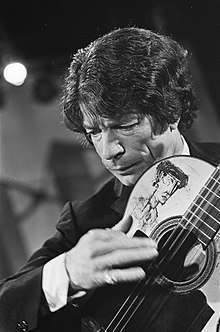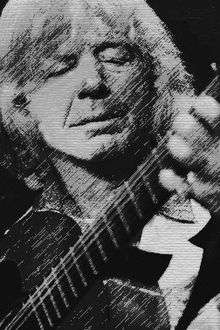Manitas de Plata
Ricardo Baliardo (7 August 1921 – 5 November 2014), better known as Manitas de Plata, was a flamenco guitarist born in Southern France.[1] Despite achieving worldwide fame, he was criticized for not following certain rhythmic rules (compás) that are traditional in flamenco.[2]
Manitas de Plata | |
|---|---|
 Manitas de Plata in 1968 | |
| Background information | |
| Birth name | Ricardo Baliardo |
| Born | 7 August 1921 Sète, France |
| Died | 5 November 2014 (aged 93) Montpellier, France |
| Genres | Flamenco |
| Occupation(s) | Musician |
| Instruments | Guitar |
| Associated acts | Los Reyes, Gipsy Kings |
Life and career

Ricardo Baliardo was born in a gypsy caravan in Sète in southern France.[1] He became famous by playing each year at the Saintes-Maries-de-la-Mer gypsy pilgrimage in Camargue, where he was recorded live by Deben Bhattacharya.
Manitas de Plata ("Little Hands of Silver" in Spanish) only agreed to play in public ten years after the death of Django Reinhardt, unanimously considered the king of gypsy guitarists. One of his recordings earned him a letter from Jean Cocteau acclaiming him as a creator.[3]
Upon hearing him play at Arles in 1964, Pablo Picasso is said to have exclaimed "that man is of greater worth than I am!" and proceeded to draw on the guitar.[3]
Manitas de Plata garnered fame in the United States only after a photography exhibition in New York, organized by his friend Lucien Clergue. He had recorded his first official album in the chapel of Arles in France, in 1963, for the Phillips label. It was later re-released, in 1967, by the Connoisseur Society label and sold through the Book of the Month Club. This was a popular LP that brought him to the attention of an American audience. An American manager obtained a booking for him to play a concert in Carnegie Hall in New York on November 24, 1965.[4]
He toured the world from 1967, and recorded discs. He played with the dancer Nina Corti.[3] In 1968 he played at the Royal Variety Performance in London. He toured Australia in September 1972 supported by Los Baliardos (Hippolyte Baliardo, Manero Baliardo, José Reyes, Ricardo Bissaro).[5]
Manitas de Plata was the father of Jacques, Maurice, and Tonino Baliardo and uncle to Paul, François (Canut), Patchaï, Nicolas and André Reyes (the sons of his cousin, flamenco artist José Reyes (1928-1979), all members of the Catalan Rumba band Gipsy Kings. Australian multi-instrumentalist Chris Freeman, his student in 1971, acknowledged de Plata's influence and teachings.[6][7]
Manitas de Plata died in a retirement home in Montpellier on 6 November 2014. The cause of death was not disclosed, although it was reported that de Plata had been in poor health since suffering a severe heart attack in April 2013.
Many members of his own family were also well known flamenco musicians, including his younger brother Hippolyte Baliardo (1928-2009), and his eldest son Manero Baliardo (1940-2012). Another son, Bambo Baliardo, is still an active musician and performer as of 2015.
Selected albums
- Juerga! (1963, Philips, 844 535 PY)[8]
- Flamenco Guitar (1965)
- Flamenco Guitar
- Manitas de Plata - The world's greatest living flamenco artist (1966, Phillips, BL 7787)
- Manitas et les siens (1967, Columbia Records, FL 363)
- Flamenco Magic (1967, Columbia Records, CS 9558)
- Flamenco!! (L'Espagne De Manitas) (1968, CBS, 63449)
- The Art of the Guitar (1968, Everest Records, SDBR 3201)
- La guitare d'or de Manitas (1970, Columbia Records, S 63915)
- Et Ses Guitares Gitanes (1972, CBS, S65020)
- Excitement of Manitas De Plata (1973, RCA Camden, CDS 1139)
- Hommages (1973, Embassy Records, S EMB 31003)
- Soleil des Saintes-Maries (1978)
- Feria Gitane (1994)
- Olé (1969)
- Manitas de Plata at Carnegie Hall (1995)
- Flaming Flamenco (1997)
- Manitas de Plata (1998)
- Camargue de Manitas (1999)
- Guitare D'Or Manitas de Plata (1999)
- Flores de mi corazon (1999, Troubadour Records)
- Guitarra Flamenco (2001)
- Manitas de Plata y los Plateros (2004)
See also
- Gitanos, Romani people in Spain
- Los Niños de Sara
References
- Live performance, 1997 at fr.kat.ph
- Pohren, Donn (1972), The Art of Flamenco, 3rd Edition, p. 79. "And the famous Manitas de Plata? A farce among flamenco guitarists, alarmingly deficient in his knowledge of flamenco, generally off even in his compás, of mediocre technique, but good, if nothing else, for a laugh."
- esbb.net Archived 2007-06-30 at the Wayback Machine; Biography of Manitas de Plata, accessed 6 November 2014. (in French)
- "Who makes music and where". New York Times. 21 November 1965.
- https://www.ausstage.edu.au/pages/event/14406
- McFarlane, 'Chris Freeman' entry at the Wayback Machine (archived August 3, 2004). Archived from the original on 3 August 2004; retrieved 27 June 2013.
- Bolton, Matthew (1 April 1982). "Show Scene". The Age. Fairfax Media. Retrieved 27 June 2013.
- Recorded in Arles, France, in October 1963, and featured Jose Reyes and Manero Baliardo, and the gypsies of Les Saintes Maries de la Mer. Producer E. Alan Silver; recording Engineer David B. Jones. Re-released by Connoisseur Society in 1967 as CS2003.
External links
| Wikimedia Commons has media related to Manitas de Plata. |
- Profile, Foroflamenco.com; accessed 6 November 2014